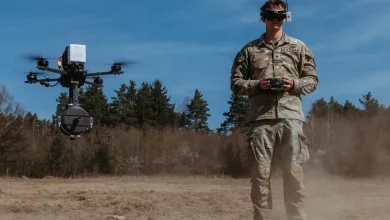Texas Defense Startup Demos Marine Drones for Counter China Initiative

A Texas-based defense startup recently demonstrated a pair of Autonomous Surface Vessels (ASV) being developed for the Pentagon’s China-focused Replicator program.
Saronic Technologies demonstrated its Cutlass and Spyglass ASVs during the US Navy’s Integrated Battle Problem (IBP) 24.1 exercise, featuring third-party payloads to deliver diverse effects in contested waters.
Integration With Third-Party Payloads
During the exercise, the 14-foot (4.26-meter) Cutlass was integrated with an Anduril ALTIUS loitering munition, extending its launch point.
The demonstration also helped the companies address networking challenges prevailing in maritime operating environments.
“Maritime communication systems face multiple obstacles, including limited bandwidth, dynamic vessel environments, and vulnerability to interference and jamming,” Saronic co-founder and vice president of Software Vib Altekar said.
“At IBP 24.1, Saronic demonstrated how Cutlass can help overcome these challenges to extend C2 networks and relay information on the water to provide commanders with enhanced warfighting capabilities.”
Swarm of Marine Drones
Saronic also demonstrated the 6-foot (1.82 meters) Spyglass ASV designed for tactical deployment, alone or in collaborative swarms.
Multiple Spyglass ASVs were operated in concert to stealthily “detect and track a vessel during nighttime intelligence, surveillance, and reconnaissance (ISR) operation,” Saronic explained.
“Navy operators were able to control multiple Spyglass ASVs from a single user interface utilizing beyond line of sight (BLOS) communications.”
Attritable Platform
The attritable ASV is equipped with advanced sensors and a configurable payload. It can be launched and recovered from surface vessels and ashore.
Moreover, both platforms were integrated with Anduril’s Lattice command and control software during the demonstration.
“We are proud of our work integrating Lattice with a variety of unmanned systems at IBP 24.1 to enable resilient, robust, and low-latency command and control of heterogeneous multi-domain unmanned systems,” senior vice president of Engineering at Anduril Industries Tom Keane said.
“Saronic was a great mission partner at the exercise, seamlessly integrating Anduril hardware and software to achieve mission objectives.”
Counter-China Program
Saronic raised $55 million in private capital last year to research, develop, and produce autonomous maritime vessels as a potential option for the Replicator program.
The strategy envisages the quick deployment of swarms of aerial and maritime drones to deter a potential Chinese invasion of Taiwan.
The initial fleet of unmanned craft for the initiative will cost around $1 billion, according to US Deputy Defense Secretary Kathleen Hicks.
The amount will be divided into two tranches spanning fiscal 2024 and 2025.





